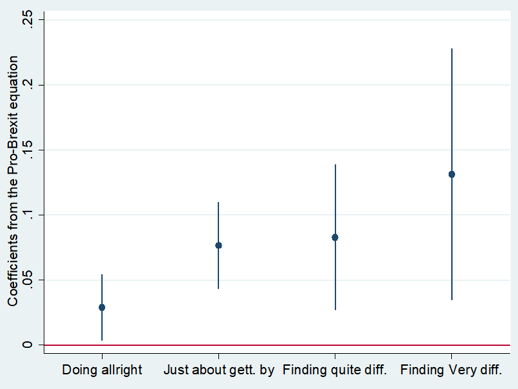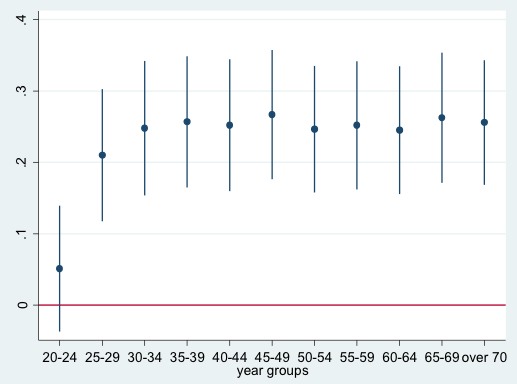Originally published on 17 October 2017 at Vox By Federica Liberini, Andrew Oswald, Eugenio Proto, Michela Redoano There is a very wide debate on the determinants of the vote by British citizens to leave the EU. In particular, the idea that this vote reflects discontent and disillusionment has been widely discussed in the UK and European media. Furthermore, large numbers of newspaper and TV journalists have suggested that the decision to leave the EU was forced on the country by special groups (particularly old voters swamping the views of the young, and discontented citizens swamping the views of others). Accordingly, there is already a number of academic writings on the topic. Some have emphasised the concept of a divided
Topics:
Guest Author considers the following as important: britain, European breakup, income inequality, Political Economy, politics
This could be interesting, too:
tom writes The Ukraine war and Europe’s deepening march of folly
Robert Skidelsky writes Lord Skidelsky to ask His Majesty’s Government what is their policy with regard to the Ukraine war following the new policy of the government of the United States of America.
Joel Eissenberg writes No Invading Allies Act
Ken Melvin writes A Developed Taste
Originally published on 17 October 2017 at Vox
By Federica Liberini, Andrew Oswald, Eugenio Proto, Michela Redoano
There is a very wide debate on the determinants of the vote by British citizens to leave the EU. In particular, the idea that this vote reflects discontent and disillusionment has been widely discussed in the UK and European media. Furthermore, large numbers of newspaper and TV journalists have suggested that the decision to leave the EU was forced on the country by special groups (particularly old voters swamping the views of the young, and discontented citizens swamping the views of others).
Accordingly, there is already a number of academic writings on the topic. Some have emphasised the concept of a divided nation (e.g. Dorling 2016). Hobolt and de Vries (2016) explore the scepticism towards EU values, and Ginsburgh et al. (2017) the probable cultural and economic repercussions of Brexit. The majority of the early empirical studies that investigate the explanation for the Brexit vote have pointed to economic forces and immigration-related factors (e.g. Clarke et al. 2017, Goodwin and Milazzo 2017), although interestingly Becker et al. (2017) argue that exposure to immigration was not particularly important but that economic forces and deprivation were powerful. Other contributions emphasise the effect of education – Hobolt (2016) showed that Brexit was favoured by the less-educated, the poorer and older voters, and those who expressed concerns about immigration and multi-culturalism. Along similar lines, Goodwin and Heath (2016) attributed Brexit more specifically to the ‘left behind’, as caused by poverty and a general lack of education and opportunities.
There is a literature within quantitative social science (including Di Tella and MacCulloch 2005, and Liberini et al. 2017a) that uses ‘happiness’ data to try to understand political decisions. Building on this literature, in a new paper we analyse the determinant of the answer “Leave the European Union” to the question “Should the United Kingdom remain a member of the European Union or leave the European Union?”, asked in the last wave of the Understanding Society data set between January and June 2016, and reporting information on approximately 8,000 citizens (Liberini et al. 2017b). Our analysis produces two results that currently may not be widely understood.
The effects of unhappy feelings
First, there is evidence in our study that unhappy feelings contributed to Brexit. However, the key channel of influence was not through general dissatisfaction with life; it was through a person’s narrow feelings about his or her own financial situation.
How can ‘discontent’ be incorporated into a statistical study? We focus especially on the following two questions that are asked of respondents in the Understanding Society survey.
The first question asked about overall life-satisfaction: “On a scale of 1 to 7 where 1 = ‘Completely Dissatisfied’ and 7 = ‘Completely Satisfied’, please tell me the number which you feel best describes how dissatisfied or satisfied you are with the following aspects of your current situation”.
The second question asked about people’s feelings about their financial situation: “How well would you say you yourself are managing financially these days? Coded from 1 (Living comfortably) to 5 (Finding it very difficult)”.
General dissatisfaction (first question) is predictive of a pro-Brexit position to a limited extent. We find that it was only the small number of completely dissatisfied citizens (that extreme answer is given by only 2% of the UK population) who wish disproportionately, in a statistically significant way, to leave the EU.
On the other hand, Figure 1 illustrates graphically a powerful pattern in the effects of respondents’ feelings about their finances (second question) on the leave vote. Unlike in the pattern for the life-satisfaction scores, here a steady increase in the coefficients is noticeable. Moving to the right across the chart, people feel steadily less happy with their financial situation, and then are progressively more likely to favour the Leave position. The implied sizes are fairly substantial – for example, UK citizens who feel things are very difficult financially are approximately 13% points more likely to be in favour of leaving the EU than those who feel their finances are comfortable. Overall, our statistical analysis suggests that financial feelings are amongst the strongest correlates with citizens’ views on the desirability of Brexit.
Figure 1 The financial feelings profile of those wishing to leave the EU
Notes: as calculated from a Brexit equation, Column 2 of Table 3 in Liberini et al. (2017b). 95% CI shown. The vertical axis is a measure of the probability of wanting to leave the EU.
The effect of age
Despite what some commentators have suggested, based on our estimates Brexit was not caused by the old. Looking at Figure 2 – featuring in the vertical axis a measure of support for Brexit – we note that the Understanding Society data set suggests that only the very youngest UK citizens (those under the age of 25) were substantially pro-Remain. Between their late-20s and their 70s, people who live in the UK have almost indistinguishable views on the desirability of EU membership. Therefore, the data suggest that Brexit was not, in a general sense, caused by old people.
Figure 2 Age profile of those wishing to leave the EU
Notes: as calculated from a Brexit equation in Liberini et al. (2017b), Column 1 of Table 3. 95% CI shown.The effect of other individual characteristics
Some other patterns emerged. Consistent with the rest of the literature, we find a strong association between having high qualifications and favouring Remain. Having a university degree or equivalent made people more likely to vote Remain (by 16%). People with children are less likely to want to leave the EU (by 4%). There is also evidence of an ethnic influence – those who classify themselves in the survey as ‘white British’ are somewhat more likely to vote for Brexit (by 6%). Interestingly enough, being unemployed has only a small positive or no effect on the decision to leave. Being married has no significant effect. Finally, and perhaps against some commentators’ intuitions, living in a rural area has no discernible consequences. There were also regional effects, and some evidence, in the run-up to the final few weeks before the vote, of a slightly rising tendency to favour Leave.
Main conclusions
Two new findings emerge from our study.
- First, unhappy feelings contributed to Brexit. However, contrary to commonly heard views, the key channel of influence was not through general dissatisfaction with life; it was through a person’s narrow feelings about his or her own financial situation.
- Second, despite some commentators’ guesses, Brexit was not caused by old people. Only the very young were substantially pro-Remain.
References
Becker, S O, T Fetzer, and D Novy (2017), “Who voted for Brexit? A comprehensive district-level analysis”, CAGE Working Paper 305, October.
Clarke, H D, M Goodwin, and P Whiteley (2017), “Why Britain voted for Brexit: An individual-level analysis of the 2016 referendum vote”, Parliamentary Affairs, 70, 439-464.
Di Tella, R, and R MacCulloch (2005), “Partisan social happiness”, Review of Economic Studies, 72.
Dorling, D (2016), “Brexit: The decision of a divided country”, BMJ: British Medical Journal, 354, Article number i3697.
Goodwin, M, and C Milazzo (2017), “Taking back control? Investigating the role of immigration in the 2016 vote for Brexit”, British Journal of Politics & International Relations, 19, 450-464.
Goodwin, M, and O Heath (2016), Brexit vote explained: poverty, low skills, and lack of opportunities, Joseph Rowntree Foundation.
Ginsburgh, V, J D Moreno-Ternero, and S Weber (2017), “Ranking languages in the European Union: Before and after Brexit”, European Economic Review, 93, 139-151.
Heath, O, and M Goodwin (2017), “The 2017 General election, Brexit and the return to two-party politics: An aggregate-level analysis of the result”, Political Quarterly, 88, 345-358.
Hobolt, S B (2016), “The Brexit vote: A divided nation, a divided continent”, Journal of European Public Policy, 23, 1259-1277.
Hobolt, S B, and C de Vries (2016), “Turning against the Union? The impact of the crisis on the Eurosceptic vote in the 2014 European Parliament elections”, Electoral Studies, 44, 504-514.
Liberini, F, M Redoano, and E Proto (2017a), “Happy voters”, Journal of Public Economics, 146, 41-57.
Liberini, F, A Oswald, E Proto, and M Redoano (2017b), “Was Brexit caused by the unhappy and the old?”, CAGE Working Paper 342, Warwick University.


